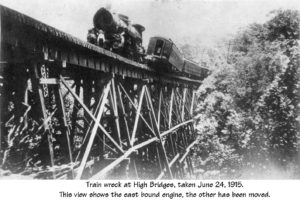
Looking Back 1915
The Wreck of the Blue Mountain Express, Part 1
by James Rada, Jr.
Note: This is the first of two articles about the wreck of the Blue Mountain Express between Thurmont and Sabillasville in 1915.
On June 25, 1915, the Blue Mountain Express, bound for Hagerstown, pulled into the Western Maryland Railroad Station in Thurmont about twenty minutes late for its 5:10 p.m. stop in town. Apparently, the train had had a hotbox that needed to be repacked while the train was in Union Bridge, according Charles Eyler in George Wireman’s book, Gateway to the Mountains.
In Thurmont, the train hurriedly took on water and dropped off Baltimore’s afternoon newspapers for delivery. The stop was short, in hopes of making up some lost time.
The express was made up of a Pullman Parlor Car, three coaches, and a baggage car. “Although it was primarily a freight line, the Western Maryland became famous for the excursion trains it ran to the Blue Ridge, and for the Blue Mountain Express, said to have been the finest train in the East,” Wireman wrote.
Meanwhile, in Hagerstown, the train dispatcher, Edgar Bloom, was busy trying to keep trains moving along the stretch of track that he watched over. Of the 180 miles under his supervision, all but 20 miles were single track. That meant if two trains were coming from different directions, he had to notify the nearest station to have one train pull off onto a siding until the other train passed.
“Bloom had been doing this for a while and knew his job, but, today, he was having trouble communicating to the east. A storm earlier in the week had knocked down a telegraph line. Add to that, the general confusion of a very busy day and Bloom lost track of countermanding an order that gave the Blue Mountain Express the right of way,” according to the Adams County News.
From Thurmont, the next stop was Sabillasville. Outside of Thurmont, the Blue Mountain Express started up the mountain on a section of single track that ran for just over two miles.
Around 5:30 p.m., local residents heard the familiar sound of the Blue Mountain Express’s train whistle, but instead of stopping, it continued blowing. People knew something was wrong and rushed to where they heard the whistle.
On the tracks, it’s not certain how soon the engineers saw the trouble coming at them. The eastbound Baltimore Unlimited came head to head with the westbound Blue Mountain Express. “It is presumed that the engineers of both trains believed the other had been ordered to take the siding to allow his train to pass, …all-steel cars helped minimize loss of life,” the Adams County News reported.
The two engines hit. The impact crumpled some cars and knocked others off the High Bridge, over Owens Creek, and into the ravine one hundred feet below.
Seconds before the crash, Fireman Vendergerst, on the Baltmore Unlimited, “made a thrilling leap for safety,” according to the Frederick News. It did him little good. He was found later with a broken back and legs broken in several places. He was taken to the hospital in Hagerstown.

- B. Taylor of Westminster was sitting in the smoking car when he felt the train slowing. He thought the engineer might be applying the emergency brake.

Train wreck at High Bridges, taken June 24, 1915. This view shows the east bound engine; the other had been moved.
Photo Courtesy of Thurmontimages.com
